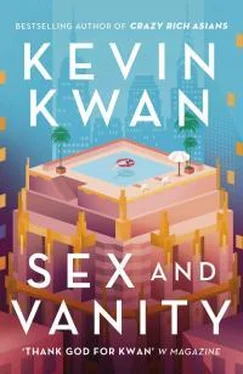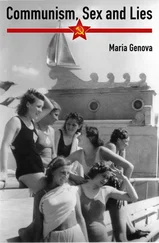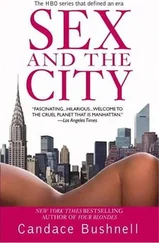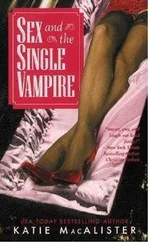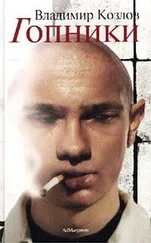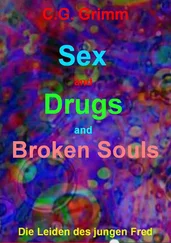Within a few minutes, the waiter returned and placed a large glass bowl on her table containing a mountain of slushy lemon granita, accompanied by a single thin slice of cantaloupe wedged onto the rim of the glass. Lucie smiled in delight at the dessert before her. It reminded her of the desserts she loved getting at Serendipity when she was a kid, although this presentation looked decidedly more elegant.
She sat at her table sipping the granita contentedly from the straw. It was deliciously icy, and the freshly squeezed lemon juice was so refreshingly tart as it went down her throat. She was wondering if she should take a nibble of the cantaloupe now or save it for after she finished the granita when, out of the corner of her eye, she saw a tall, elderly white-haired man enter the piazzetta, wobble slightly, and then stumble against the table where the Italian couple was seated. The Italian man sprang up from his chair and helped the man to his feet. The old man stood for a split second, took a step forward, and then went crashing down again, his head landing right onto Lucie’s dessert, breaking the glass bowl and splashing lemon granita all over her.
Lucie found herself glued to her chair, unable to move. It seemed as if time had stopped. No one did a thing. The Italian couple stared helplessly at the old man, the Germans just sat there, and the waiters stood like statues. All around them were dozens of glamorous-looking people, frozen at their tables and gawking. She heard the American beside her say, “I think he’s dying,” and then somewhere behind her, a lady with a British accent cried, “We. Simply. Must!” The man’s eyes rolled back, she heard a rattle deep in his throat, and his face turned blue, but all she could see was red—the red blood vessels in the whites of his eyes, the red gushing from his head onto the white tablecloth. She finally stood up, and then she felt the ground beneath her spin and everything went black.
Lucie had no idea how long she had been unconscious, maybe it was just seconds, but when she came to, she felt something warm and soft cradling her neck. She looked up and saw George Zao looking down at her and realized that his hands were cushioning her head.
“You okay?” he asked.
She nodded, and then she turned and saw a waiter hovering over the old man, who was now lying on the ground in front of her. The waiter was pounding on the man’s chest repeatedly as the Great Dane started whimpering.
“Just stay here. Don’t try to get up,” George said, jumping up and heading toward the man on the ground. “Stop hitting him like that.” He pushed the waiter aside. “Someone call a doctor!” he shouted, as he bent down, lifted the man’s chin, and gave him two quick rescue breaths.
Lucie got up from the ground slowly and began backing away from the scene. George was now frantically pumping the man’s chest and yelling, “Fucking call a doctor!” Something within her told her that she couldn’t look anymore. She couldn’t stand there and watch this man die. She turned around and started walking away. The minute she rounded the corner, out of sight of the piazzetta, she started to run.
CHAPTER SEVEN
Arco Naturale
Capri, Italy
George found Lucie sitting on a stone bench, staring out at the Arco Naturale, a gigantic natural limestone arch that rose out of the mountainside 650 feet above the sea.fn1
“Are you all right?” he asked.
Lucie fixed her eyes out on the view, purposely not looking at him. She knew there were bloodstains on his shirt, and she couldn’t bear to see them. “How did you know I was here?”
“I didn’t. After leaving the piazzetta, I just felt like coming here.”
Lucie could feel her jaw tighten. Why was he always showing up where she least wanted him to be? She got up from the bench and leaned against the green iron fence that faced the sea, hoping he would get the message.
George inhaled, as if about to say something.
“Please … don’t speak! Please don’t tell me what happened to that man. I don’t want to know,” Lucie blurted in a choked voice.
George walked up to the fence and stood near her. Just beyond the fence, the arch towered over them, rising so unexpectedly and improbably out of the cliff it looked like it could have been placed there by aliens. Through the arch was a perfect view of the sea hundreds of feet below, the water glowing in lustrous shades of aquamarine.
They took in the otherworldly view in silence, and after a while, George spoke. “The first time I came here, when I was about twelve, I was so blown away by the sight of this arch that I thought it had to be a vortex. Like maybe some sort of gateway to a parallel universe. I wanted to leap through the arch and be transported somewhere else in time.”
“I wouldn’t mind being somewhere else in time right about now,” Lucie said numbly.
“Follow me.” George moved suddenly, and Lucie thought for a second that he was actually going to hop over the fence. Instead, he began heading toward the trail that led down the mountainside. She debated whether she wanted to follow him and then thought, What the hell?
Lucie walked a few paces behind George as they headed along a steep paved trail and then down a long set of steps that wound along the thickly forested part of the island.
“Pablo Neruda would hike this trail every day when he lived on the island,” George said.
Lucie said nothing, but she was surprised by this bit of trivia coming from George. He didn’t seem like the type to read poetry. At the bottom of the steps, they rounded a corner and she found herself standing at the mouth of a cavern. She realized with an unexpected jolt that they were at the Grotta di Matermania. It was one of the places she had put on her must-see list—a natural cavern that was one of the most ancient archaeological treasures of the island.fn2
“You wanted to go somewhere back in time, so here we are,” George said.
Lucie wandered into the cavern, where walls and stairways had been carved out of the limestone to create different levels and spaces within. This was once a nymphaeum for the ancient Romans, she thought, placing her hand against the cavern walls, strangely warm to the touch, and wondering what mystical rituals these ruins must have witnessed through the ages. She could feel a strange energy pulsating throughout the cave, the same energy she felt when she had visited other ancient sites, like Stonehenge and the Mayan temples at Tulum.
At the back of the cavern rose a natural formation that resembled an altar, no doubt the focal point of ceremonies when the cavern was itself a temple. Lucie climbed up to stand in front of the altar and closed her eyes. She wasn’t religious by any means—her mother’s family was Buddhist and her father’s was nominally Episcopalian—but something compelled her to say a silent prayer for the man in the piazzetta.
When she opened her eyes, George was nowhere in sight. She wandered out of the cavern, but he wasn’t there either. Should she head back up the steps, or keep going down the trail? She decided to explore a little further, feeling a bit annoyed with herself as she wandered along a path that seemed to be taking her farther and farther down the hill. Where would this lead to? Why in the world was she even looking for George? Hadn’t she told him she wanted to be alone? There was something about George—something in the way he spoke, his mannerisms, and his whole vibe—that she found so unsettling, and yet here she was thinking about him again.
It dawned on her that she had never really known another Asian guy before. Asian women, like her mother, Isabel, and so many of her classmates, had naturally always been part of her life, and at Brearley there had even been three other half-Asian girls in her year. But somehow she had lived her whole life hardly ever interacting with another Asian boy. Freddie didn’t count at all—in striking contrast to her, he took after their father in appearance and behaved like the quintessential WASP, right down to his smelly old Sperrys. Strangers meeting them never thought they were related, and someone even mistook Freddie as her boyfriend once. She had met some of her male Chinese cousins from Seattle and Hong Kong when she was younger, but they barely made an impression. Of course, it didn’t help that she had gone to an all-girls school like Brearley and lived her whole life on the Upper East Side. Sure, there were a few Asians here and there at the private schools around her neighborhood, but most of the Asian boys in the city went to Stuyvesant,fn3 or so she heard. Plus, the guys she had known were all Asian Americans, and George was nothing like them. He was a Chinese boy from Hong Kong who had spent a few years in Australia. So what exactly did that make him? He didn’t seem Australian, despite his quasi-Aussie accent. He was much more Chinese in his ways. He sounded strange, he moved strange, he dressed strange. He probably smelled strange too.
Читать дальше
